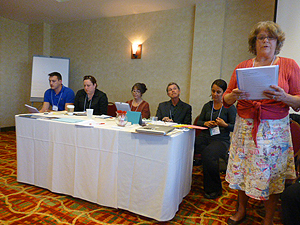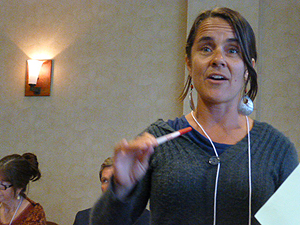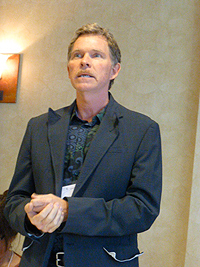Keep the Community in Community Colleges
By Debora Bone, CCFT President
 Ten CCFT delegates attended the CFT Convention in Manhattan Beach on March 21-23. Seven members of our team presented a workshop called “Keep the Communityin Community Colleges” to a standing-room-only crowd. The panel included moderator John Govsky, instructors Susan Stuart, Tobin Keller, Beth McKinnon, Katie Woolsey, Steve Schessler and CCFT director Maya Bendotoff.
Ten CCFT delegates attended the CFT Convention in Manhattan Beach on March 21-23. Seven members of our team presented a workshop called “Keep the Communityin Community Colleges” to a standing-room-only crowd. The panel included moderator John Govsky, instructors Susan Stuart, Tobin Keller, Beth McKinnon, Katie Woolsey, Steve Schessler and CCFT director Maya Bendotoff.
The team gave an overview of the new repeatability regulations, passed by the Community College Board of Governors, after the 2012 passage of the Student Success Act by the legislature. Cabrillo faculty are leading a statewide push to address the unintended consequences of these regulations that are limiting access and impeding student success. Colleagues from colleges across the state added their stories to ours.
Beth Mc Kinnon spoke about how underprepared students, second language learners and those with learning differences may need to repeat a course to solidify their skill level before passing to the next level of competency. The basic skills of language acquisition, writing, calculation and critical reasoning often require significant repetition in order to gain fluency and confidence.
Katie Woolsey spoke about creative writing students and how it takes more than one fifteen-week course to develop these skills. Students preparing for transfer need to build portfolios with poetry, fiction, memoirs and other skills. The content of these courses rotates to expose students to the breadth and depth of creative writing possibilities. Also in English, Steve Schessler spoke of how long it takes to master the art and skills needed for journalism majors. Additionally foreign language learners require many hours of practice and exposure to advance to proficiency.
Susan Stuart talked about the Resolution that CCFT brought to the Convention, asking for CFT to advocate actively for the Board of Governors to change the regulation. She noted that visual and performing arts students rely on multiple course opportunities to gain skills, build portfolios, experience performing and technical theater opportunities. This is a social justice issue for students coming from underserved areas with poor arts programs at the high school level, as well as those who cannot afford private lessons in art or music.
The policy of putting courses into “families” and limiting students’ ability to take multiple courses within each family further reduces access to the “practice, practice, practice” required for mastery of an instrument, dance or theatrical performing skills. Tobin Keller told how he has rewritten the studio arts curriculum to maximize student opportunities, yet curriculum is not the solution. Program leadership has been reduced in recent years, with a decrease of fulltime faculty from ten to three while coordinating up to thirty adjunct faculty, managing new facilities and continuing to serve 1300 students annually.
Lifelong learners are very discouraged. They bring a presence to class that elevates the level of learning, serving to inspire and mentor younger students. The district proposal to move the arts programs to the college Extension suggests wrongly that the Arts are somehow a “lesser” part of education, denying the breadth, depth and inclusiveness of a comprehensive college. Fighting to reverse these restrictions is critical to preserve the quality of education in our colleges.
A robust discussion ensued, with faculty from other colleges pointing out how life-long learning allows older students to become well-educated citizens. There has been an enormous cost to colleges to adjust curriculum and adapt to regulations.
enormous cost to colleges to adjust curriculum and adapt to regulations.
One comment suggested that these policies are NOT mistakes, rather they are intentional changes that reflect the interest to educate only the few students needed to meet workforce needs in science, industry and the military. The system has prioritized basic skills, transfer and CTE while disregarding the value of the arts, humanities and life long learning. Decreasing enrollment is a way to decrease cost, but it does not meet the shared social need for an educated community. CFT members are determined to keep community colleges for the people and to resist the agenda of the corporate elite.
The call to action includes reaching out to faculty across the state and in the faculty senates where a united appeal to change the regulations can take shape.
Elsewhere in this newsletter, see information about Cabrillo Day of Action on April 23 and Cabrillo in Dialogue on May 1. Hope to see you there!
